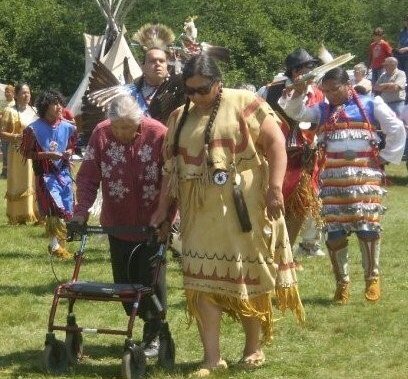
Dementia projected to surge 273% in Indigenous communities while support services lacking
Global News
New research from the Alzheimer Society projects dementia to surge 273% among Indigenous people in the coming decades
New research by the Alzheimer Society shows Indigenous communities should brace for a whopping 273% increase in dementia cases by 2050, substantially higher than the potential 187% increase forecast for the overall population in Canada.
Dementia is a broad term for symptoms caused by progressive loss of brain function. It can impair judgment and memory, the ability to perform daily tasks, affect mood and behavior and lead to the loss of independence. Alzheimer’s is one of 50 types of dementia.
Advancing age is the most common factor as well as genetics and gender. But a combination of additional factors puts the Indigenous population at a higher risk, according to The Landmark Study Part 2: The Many Faces of Dementia in Canada released today.
“When examining social determinants of health and dementia, the stress resulting from factors such as racism, inadequate housing, poverty, residential schools and colonialism cannot be ignored,” reads the study, conducted by the Canadian Centre for Economic Analysis for the Alzheimer Society of Canada.
It estimates that in 2020 there were 10,800 people of Indigenous ancestry living with dementia in Canada. By 2050, that number is projected to be 40,300.
Beckie LaBillois and her family at Eel River Bar First Nation in New Brunswick cared for their mother Margaret who lived with dementia until her passing in 2013 at age 89. Margaret was an Air Force veteran, Order of Canada recipient, champion and educator of Mi’Kmaq language and culture and the first female chief of a First Nation in New Brunswick.
“My mother was once an icon all over Canada, the United States and even overseas,” LaBillois said. “When dementia crept in, it stole their beloved matriarch and took the whole family to pitch in with her care. The first thing is, for all our First Nations people, is get educated (about dementia). As well, know your limits to being able to care for someone.”
Arranging for power of attorney to manage a loved one’s finances is as important as finding support and care services.

Many kids and teens are looking forward to the holidays with great excitement, but others find it a difficult time of year filled with anxiety, stress and loneliness. It’s something Alisa Simon, the chief youth officer at Kids Help Phone, says they watch for when school pauses for the winter break, noting, “we do see an increase...










